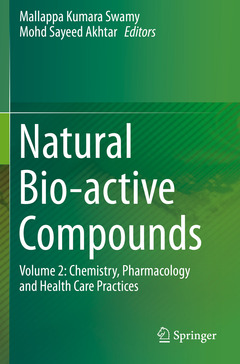Natural Bio-active Compounds, 1st ed. 2019 Volume 2: Chemistry, Pharmacology and Health Care Practices
Langue : Anglais
Coordonnateurs : Swamy Mallappa Kumara, Akhtar Mohd Sayeed

Nature has consistently provided human beings with bioactive compounds that can be used directly as drugs or indirectly as drug leads. Some of the major classes of natural bioactive compounds include phenolics, alkaloids, tannins, saponins, lignin, glycosides, terpenoids, and many more. They possess a broad range of biological activities and are primarily useful in the treatment of various health issues. At the same time, the search for new and novel drugs is never-ending and, despite major advances in synthetic chemistry, nature remains an essential resource for drug discovery.
Therefore, more and more researchers are interested in understanding the chemistry, clinical pharmacology, and beneficial effects of bioactive compounds in connection with solving human health problems. This book presents a wealth of information on natural metabolites that have been or are currently being used as drugs or leads for the discovery of new drugs. In addition, it highlights the importance of natural products against various human diseases, and their applications in the drug, nutraceuticals, cosmetics and herbal industries. Accordingly, the book offers a valuable resource for all students, educators, and healthcare experts involved in natural product research, phytochemistry, and pharmacological research.
Chapter 1. Secondary Metabolites from Rosemary (Rosmarinus officinalis L.): Structure, Biochemistry and Therapeutic Implications against Neurodegenerative Diseases.- Chapter 2. The role of plant metabolites in drug discovery: Current challenges and future perspectives.- Chapter 3. Current insights on the role of terpenoids as anticancer agents: a perspective on cancer prevention and treatment.- Chapter 4. Myristica fragrans Houtt.: Botanical,Pharmacological and Toxicological Aspects.- Chapter 5. Coscinium fenestratum: A Review on Phytochemicals and Pharmacological Properties.- Chapter 6. Computationally Designed Recombinant-DNA-Based Compounds Production Driven in Plants during Secondary Metabolism and Their Implication in Anti-Malaria Therapies.- Chapter 7. Curcumin-Loaded Nanoparticles and Their Potential as Anticancer Agents in Breast Cancer.- Chapter 8. Techniques for Extraction, Isolation and Standardization of Bioactive Compounds from Medicinal Plants.- Chapter 9. Phytotherapeutics: The Substitutes for Glioblastoma multiforme.- Chapter 10. Cosmetic Potential of Natural Products: Industrial Applications.- Chapter 11. Natural Compounds Extracted from Medicinal Plants and Their Applications in the Treatment of Diabetes and Hypertension.- Chapter 12. Plant Metabolites as New Leads to Drug Discovery.- Chapter 13. Natural Compounds Extracted from Medicinal Plants and their Applications in Cardiovascular and Kidney Diseases.- Chapter 14. Therapeutic Potential of Plant Polyphenolics and Their Mechanistic Action against Various Diseases.- Chapter 15. Phytochemical Aspects of Medicinal Plants of North-East India to Improve the Gynecological Disorders: An Update.- Chapter 16. Bio-active compounds from Unani medicinal plants and their application in Urolithiasis.- Chapter 17. Therapeutic Potential of Rhizomatous Plants used in Unani Medicare System.- Chapter 18. Extraction Techniques for Plant based Bioactive Compounds.
Dr. Mohd Sayeed Akhtar (PhD) is an Assistant Professor at Gandhi Faiz-e-Aam College, Shahjahanpur, UP, India. He received his PhD degree from Aligarh Muslim University (AMU), India in 2008, prior to conducting post-doctoral research at the Botanical Institute, University of Basel (BIB), Switzerland (2008–2010), and at Chonbuk National University (CBNU), Republic of Korea in 2011. He was an Assistant Professor at Jimma University, Ethiopia (2011-2014), and a fellow researcher at the Institute of Tropical Agriculture, Universiti Putra Malaysia (UPM), (2014-2015). Dr. Akhtar has more than 15 years of research and 10 years of teaching experience in soil microbiology, applied microbiology, environmental microbiology, molecular biology, plant pathology and plant nanobiotechnology. He has authored or co-authored more than one hundred articles in peer-reviewed journals, conference proceedings, and book chapters, and has edited 10 books with international publishers. Further, he serves as an editorial board member and reviewer for several high-impact international journals. His current research is focused on rhizospheric plant-microbe interactions and molecular biotechnology, bioremediation, biomineralization, nano-fertilizers and nanobiotechnology.
Dr. Mallappa Kumara Swamy (PhD) is a Professor and Head of the Department of Biotechnology at East West College of Science, Bengaluru, Karnataka, India. He completed his postdoctoral research at the Department of Crop Science, Faculty of Agriculture, Universiti Putra Malaysia (UPM), Serdang, Selangor, Malaysia. Before that, he had worked as an Associate Professor and Head of the Department of Biotechnology, Padmashree Institute of Management and Sciences, Bangalore University, Bengaluru, India. He received his PhD (Biotechnology) from Acharya Nagarjuna University, Guntur, India in 2013. He has more than 15 years of teaching and research experience in the fields of plant biotechno
Elaborates major classes of compounds like alkaloids, tannins, saponins, lignin, glycosides, and terpenoids, which are integral part of plant-microbe interactions for adapting to environmental irregularities Describes the chemistry of bioactive plant secondary metabolites, their production and pharmacological properties, as well as biotechnological approaches to tackling various human diseases Offers a valuable asset for all students, educators, and healthcare professionals involved in medicinal plant cultivation, plant tissue culture, in vitro production of secondary metabolites, and therapeutic research
Date de parution : 10-2020
Ouvrage de 492 p.
15.5x23.5 cm
Date de parution : 10-2019
Ouvrage de 492 p.
15.5x23.5 cm
Thèmes de Natural Bio-active Compounds :
© 2024 LAVOISIER S.A.S.



